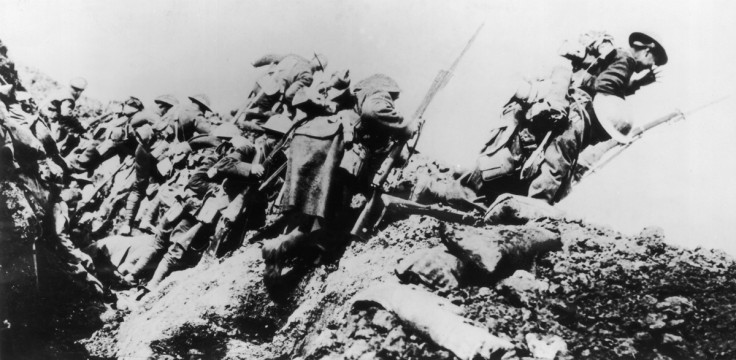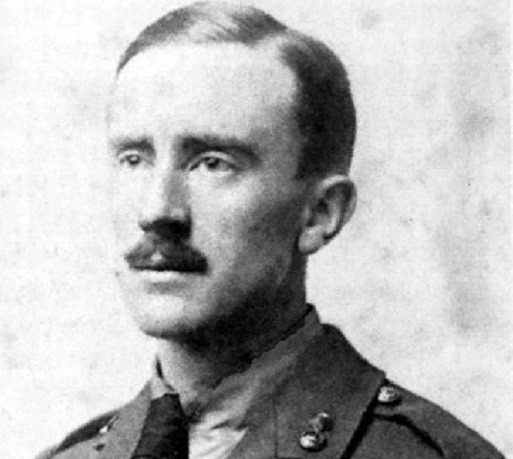Fellowship of the Ring 60th Anniversary: How the Masterpiece Reflects JRR Tolkien's WW1 Involvement

In a letter to Professor L.W. Forster written on New Year's Eve in 1960, JRR Tolkien reemphasised that his fictional middle-earth was not reliant on the events of the two World Wars which spanned much of the first half of his life.
"Personally, I do not think that either war had any influence upon either the plot or the manner of its unfolding," he wrote.
In an afterthought, he added that some scenes may have been inadvertently influenced by the Battle of the Somme in 1916: "Perhaps in the landscape. The Dead Marshes and the approaches to the Morannon owe something to Northern France after the Battle."
Although Tolkien vehemently denied the First World War had any direct influence on his fantasy masterpieces The Lord of the Rings and The Hobbit, fans and critics alike state otherwise. And albeit coincidentally, on the week commemorating the outbreak of the First World War, today marks the 60th anniversary of the publication of JRR Tolkien's fantasy masterpiece The Fellowship of the Ring, the first instalment in the Lord of the Rings trilogy.
Tolkien's work has been the subject of analysis for years, with many of the fictional locations and characters recognisably inspired by the author's childhood in Birmingham. But alongside the nods towards the West Midlands and the Black Country, a darker theme underpins his writing – Tolkien's military service during World War One.

When Britain entered the war on 4 August, Tolkien's relatives were shocked when he decided to put volunteering for the Army on hold.
In a 1941 letter to his son Michael, Tolkien recalled: "In those days chaps joined up, or were scorned publicly. It was a nasty cleft to be in for a young man with too much imagination and little physical courage."
Instead, he delayed enlistment until he had completing his final exams at Oxford University, for which he received a first class degree in literature. In July 1915, Tolkien was commissioned as a Second Lieutenant in the Lancashire Fusiliers, and was transferred the the 11<sup>th Battalion with the British Expeditionary Force. He arrived in France in June 1916.
Tolkien saw his first active service as a signals officer during the Battle of the Somme, the conflict fought between July and August 1916 which saw the first diagnosis of shell shock –post-traumatic stress disorder. Frodo, a home-loving hobbit on a quest to destroy Sauron's malevolent ring, suffers nightmares, mental illness and even after his journey, is no longer comforted by home – all symptoms of post-traumatic stress.
In the second novel, the Two Towers, Frodo's journey takes him to the Dead Marshes – an area of swampland that was the site of the ancient Battle of Dagorlad. It doesn't take a wild imagination for Tolkien's writing to conjure an image of a desolate battle ground. "Dreary and wearisome. Cold, clammy winter still held sway in this forsaken country," he writes. "The only green was the scum of livid weed on the dark greasy surfaces of the sullen waters." When Frodo looks in the waters, he sees the faces of the dead. Some are "good", others "evil" and the rest neutral. But, like the Somme, they are all equal in death.
During his childhood at King Edwards School in Birmingham, Tolkien formed a close relationship with Chris Wiseman, Geoffrey Bache Smith and Rob Gilson. Referring to themselves as the Tea Club Barrovian Society, the quartet vowed to become literary great. By November 1916, Bache Smith and Gilson were both dead.
Tolkien and Wiseman returned from the front alive, but emotionally shattered. Although disputed by Tolkien, this sense of total loss in the scenes of bloodshed in the Battle of the Five Armies in the 1937 novel The Hobbit.
During the battle, protagonist Bilbo Baggins bitterly reflects on the ingloriousness or war – before he is knocked unconscious by a large stone thrown by a goblin from above. His bruised body hidden, he is not discovered until the next day, when he realises his friends Thorin, the leader of the Company of Dwarves, along with others, have died. Like Tolkien, Bilbo returns from battle alive, but without his beloved companions.
Speaking later, Tolkien said: "One has indeed personally to come under the shadow of war to feel fully its oppression... By 1918 all but one of my close friends were dead."
© Copyright IBTimes 2025. All rights reserved.






















